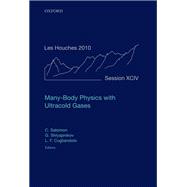Many-Body Physics with Ultracold Gases Lecture Notes of the Les Houches Summer School: Volume 94, July 2010
, by Salomon, Christophe; Shlyapnikov, Georgy V.; Cugliandolo, Leticia F.- ISBN: 9780199661886 | 019966188X
- Cover: Hardcover
- Copyright: 1/6/2013
This book gathers the lecture notes of courses given at the 2010 summer school in theoretical physics in Les Houches, France, Session XCIV. Written in a pedagogical style, this volume illustrates how the field of quantum gases has flourished at the interface between atomic physics and quantum optics, condensed matter physics, nuclear and high-energy physics, non-linear physics and quantum information. The physics of correlated atoms in optical lattices is covered from both theoretical and experimental perspectives, including the Bose and Fermi Hubbard models, and the description of the Mott transition. Few-body physics with cold atoms has made spectacular progress and exact solutions for 3-body and 4-body problems have been obtained. The remarkable collisional stability of weakly bound molecules is at the core of the studies of molecular BEC regimes in Fermi gases. Entanglement in quantum many-body systems is introduced and is a key issue for quantum information processing. Rapidly rotating quantum gases and optically induced gauge fields establish a remarkable connection with the fractional quantum Hall effect for electrons in semiconductors. Dipolar quantum gases with long range and anisotropic interaction lead to new quantum degenerate regimes in atoms with large magnetic moments, or electrically aligned polar molecules. Experiments with ultracold fermions show how quantum gases serve as ''quantum simulators'' of complex condensed matter systems through measurements of the equation of state. Similarly, the recent observation of Anderson localization of matter waves in a disordered optical potential makes a fruitful link with the behaviour of electrons in disordered systems.






